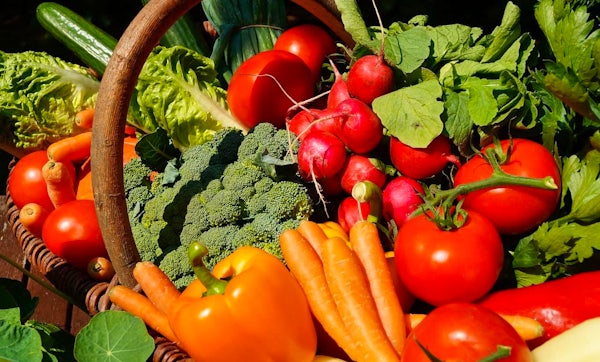Do you love to cook and often invite your friends over to enjoy your masterpieces? Or are you a complete amateur who makes more mess than edible food? Either way, it is important to know that your Master Chef skills (or the lack of them) have a significant impact on the environment, and, more importantly, that there are many things you can do to make your kitchen more environmentally friendly and less wasteful.
Here are 7 of the most common ways to go green in your kitchen, starting now.
- Back to Organic
Whenever possible, try to buy local food which has not travelled many miles or been processed or stored for a long time, such as fruits, vegetables, nuts, and seafood. Also, if you have the chance, take a walk to your local market to avoid transport costs and (particularly) harmful transport emissions!
As much as we all give in to temptation and crave sweet food, ban artificial sweeteners from entering your kitchen. Before buying groceries, take a minute or two to read the ingredients. Only buy food whose ingredients you are familiar with or whose ingredients are organic. And if you are feeling especially adventurous, try growing your own vegetables and fruit in your garden. This way you will make sure you are not eating anything artificial or processed that damages our environment. Apart from that, you will find a new interesting hobby that will make you leave the house and enjoy fresh some air.
- Collect Compost
Have you ever thought about how much food you are throwing away every day? Do you know that composting is extremely beneficial for the environment? If you compost food, it will produce carbon dioxide which is a fertilizer for new plants. On the other hand, food that ends up in a landfill generates methane gas that is damaging to the environment.
This is why throwing food into the trash wastes a valuable resource. So, the next time you want to throw away used eggshells, stop for a second and think how they can help fertilize your garden and help the environment. All you need to do is to buy a small kitchen compost bin or use any small lidded container. Fill it with ingredients such as coffee grounds, banana peels, eggshells, fruits and vegetables and turn them into a soil conditioner for houseplants, garden or your backyard by composting them.
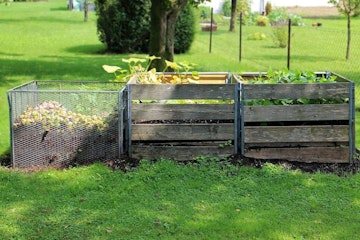
If by some chance composting isn't your thing, there are others who can do it for you! There are residential composting clubs that pick up your food remains (or you can drop it off) to generate healthy soil and nutrients in order to grow more local food. Some clubs even give out rewards, for example, for every 10 pickups you might collect vouchers to local markets or restaurants. After all, who doesn't like a good reward?!
- Buy in Bulk
One life-altering fact is that the less packaging you buy, the less garbage you will create. Now that we have caught your attention with some deep thoughts, let skip to the practical part. When you are doing your shopping, avoid single or excessively packed products and opt for single, large packages. For example, buy large bottles of water or juice, instead of buying small bottles or boxes individually. Buying large products instead of small individual ones will save you trips back to the store and help the environment. It's a win-win situation, that's for sure.

- Reduce your meat intake
The food we eat is very important, both for our health and the health of our environment. Although it might be hard to believe, meat production comes at a huge environmental cost, which is why reducing your meat intake can make a huge difference. Together with dairy products, meat production emits as much greenhouse gas as the transport itself! What's more, global meat production is expected to double by 2050, which might seriously increase global warming gases.
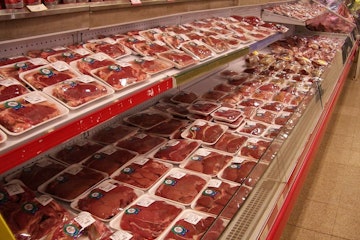
This is why avoiding meat consumption is one of the most effective ways you can reduce your negative environmental impact on the planet. Try going meat-free for one day a week - make your Mondays meat free or, if giving up meat is one of life's hardest choices you have to make, try to enrich your meat with more beans, grains or vegetables, so that you consume it less. Both your body and the environment will be so grateful!
- Glass it Up
If there is one thing we all know about plastic, it’s that it is very widely used and has a harmful influence. So, in order to avoid damaging toxins entering your system, you can try things such as storing your leftovers in multiple use plastic containers (instead of plastic cling film) good old glass jars or even ceramic containers. Go over your kitchen and try to get rid of the plastic items you might have and, what is more important, try to find an eco-friendly substitute for each plastic item you might have there. In most cases, you will probably replace plastic with glass material which is much more durable than plastic and a great way to express your creativity. There are so many beautiful designs made of glass that your biggest problem will be to choose only one.
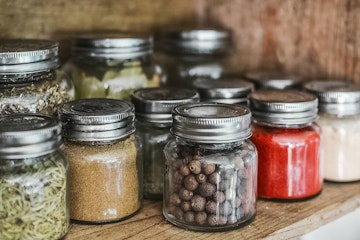
- Wash & Clean Green
One of the main sources of pollution is the detergents we use on a daily basis. Specific contaminants that cause water pollution contain chemicals (such as bleach), carcinogens and microbes that never fully degrade. So, when cleaning your kitchen, use eco-friendly cleaning products. This will not only make your kitchen more green, but it will support companies offering environmentally-friendly products and help them reach more people.
If you would like to take your cleaning to a new, more creative level, how about making your own cleaning products? There are a lot of innovative ways in which you can clean your kitchen. For example, you can use vinegar or baking soda. Baking soda will help in removing grease stains from your counter or clothes, and when mixed with vinegar, apart from your kitchen, it is excellent even for cleaning your bathroom.
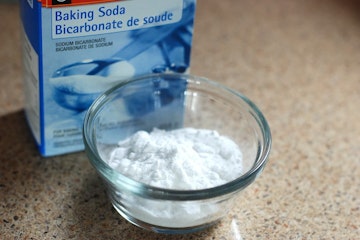
- Be energy-wise
Being energy-wise is important throughout your household, but it is especially important in your kitchen where many appliances are using electricity. Here are some tips on how to save energy in your kitchen.
Plug smaller appliances (coffee machine, microwave, toaster, etc.) into a single power strip, and unplug the appliance you are no longer using or switch the power strip off whenever they're not in use. Also, replace standard light bulbs with compact fluorescent (or CFL) bulbs which last much longer, but use less electricity. You can also install a faucet aerator to your kitchen sink which will reduce the water flow and reduce excess water.
Whenever possible, try to wash your dishes by hand and let them air dry. Finally, as tempting as the refrigerator is for what is hiding inside, make sure you do not open it every five minutes just to check what you already know is (not) inside! If you can't get rid of that annoying habit, make sure your door closes fully once you are done checking!
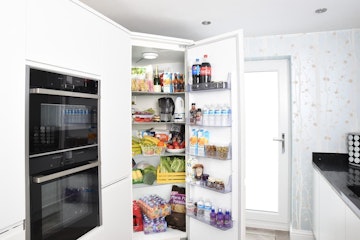
There are many, very often small, changes you can make to create a more environmentally friendly kitchen. By making changes in your purchasing behaviour, food preparation and storage habits, you can help the environment from your own home. What's more, with these simple changes to your kitchen routine, you can save both money and energy. In other words, making responsible choices for your kitchen will result positively for both your pocket and the planet.
